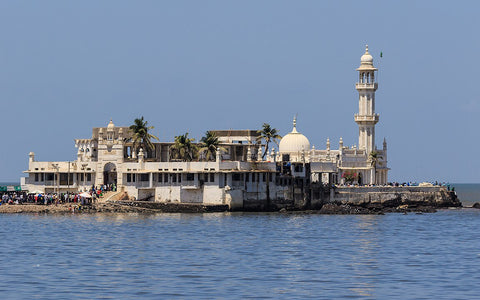Ramadan or Ramzan is the ninth month of the Islamic calendar and is considered the holiest month for Muslims worldwide. During this period, Muslims observe fasting from dawn to sunset and break their fast with a meal known as Iftar. Along with fasting, Muslims devote more time to prayer and recitation of the Quran. The culmination of Ramadan is marked by Eid al-Fitr, a three-day festival that celebrates the end of the fast. In India, Ramadan is celebrated with great enthusiasm, and people follow traditional practices that have been passed down for generations. In this article, we will explore some of the Ramadan traditions in India.
Pilgrimage
India is home to many important pilgrimage sites that are associated with Ramadan and among these, the Ajmer Sharif Dargah is one of the most significant. It houses the tomb of Khwaja Moinuddin Chishti, a revered Sufi saint who is credited with bringing Islam to India. The Dargah is a pilgrimage destination for Muslims of all sects who come to seek the saint's blessings and offer prayers. Another important site is the Haji Ali Dargah in Mumbai, located on an island off the coast of the city. Dedicated to the Sufi saint Haji Ali, this shrine draws thousands of devotees during Ramadan, who flock to offer prayers and seek blessings. The magnificent Jama Masjid in Delhi is another prominent mosque associated with Ramadan, constructed by the Mughal emperor Shah Jahan in the 17th century. Its grand Mughal architecture and sprawling courtyard make it one of the largest mosques in India. The Hazratbal Shrine in Srinagar is also a significant pilgrimage site for Muslims during Ramadan, believed to hold a strand of hair from the Prophet Muhammad's beard. Situated on the banks of the picturesque Dal Lake, the shrine attracts thousands of visitors who come to pay their respects and offer prayers.

Haji Ali Dargah Mosque in Mumbai, India
These and numerous other pilgrimage sites associated with Ramadan in India are a testament to the country's Islamic cultural and religious heritage.
Charity
Charity holds a significant place in the Islamic faith, and during Ramadan, it becomes even more important. Muslims all over India are encouraged to give generously to those in need, and this act of giving is considered an essential part of the holy month. The act of charity, known as Sadaqah, is believed to bring blessings and increase one's rewards in the eyes of God.
Many charitable organizations in India work tirelessly to provide assistance to those in need during Ramadan. They distribute food, clothing, and other essential supplies to the poor and needy, and this act of kindness is seen as a way to gain blessings and forgiveness from God. The distribution of food during Ramadan is particularly significant as it is considered a virtuous act, and the reward for feeding a fasting person is believed to be immense. Additionally, mosques and other religious institutions in India organize iftar meals during Ramadan. These meals are served at the time of breaking the fast and are open to all, especially to those who are less fortunate.

Hope Foundation's founder Saif Sultan distributes Ramadan kits
Food
In India, the iftar meal is a significant part of Ramadan, and it is a time when families and communities come together to break their fast. The iftar meal is typically a grand affair and includes a variety of dishes that are both delicious and nutritious. Dates are an important part of the iftar meal in India, and they are often the first food item that Muslims consume to break their fast. Dates are considered an ideal food to break the fast as they are rich in nutrients and provide instant energy to the body. Other than that, dishes include samosas, biryani and haleem amongst other yummy foods that are usually included in the typical Iftar meal. Special sweet dishes are also prepared during Ramadan in India and are shared with family and friends. Sheer khurma made with vermicelli, milk, and dates, is a popular sweet dish served during Ramadan and Phirni, a rice pudding flavored with cardamom and saffron, is another favorite dessert that is enjoyed during this holy month.

A popular North Indian Sweet 'Phirni' made for special occasions (Source: https://www.indianhealthyrecipes.com/)
In addition to the iftar meal, Muslims in India also eat a pre-dawn meal called Sehri. This meal is eaten before dawn and is a light meal that provides energy for the day ahead. It usually consists of foods that are rich in complex carbohydrates and protein, such as eggs, bread, and yogurt.
Art & Music
Art and music play a significant role in the cultural and religious traditions of Ramadan in India, providing a means for Muslims to express their devotion and spirituality. Qawwali, a form of Sufi music, is especially popular during this holy month and is performed at mosques and other religious gatherings, creating a meditative and spiritual atmosphere. Alongside Qawwali, calligraphy and traditional Islamic patterns are also important forms of art during Ramadan in India. Beautifully written religious verses from the Quran, often displayed in mosques and homes, showcase the intricate art of calligraphy. Traditional Islamic patterns are used to create stunning works of art, which reflect the beauty and complexity of Islamic traditions. In addition, Nasheeds, or Islamic devotional hymns, are commonly sung during iftar gatherings and other religious events, celebrating the virtues of Ramadan and promoting a sense of community and connection among Muslims.























